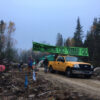KJIPUKTUK (Halifax) – Several hundred people gathered at Africville Park on the shores of the Bedford Basin in Halifax to demand reparations for the loss of their community and the centuries of racism they were made to endure.
People listened to a few speeches and then joined a march and car convoy along the perimeters of the old community, not to be confused with the one-hectare Africville park.
“Canada has apologized for the Japanese internment, the Chinese head tax, and in both cases handed out compensation. But the Black community receives nothing,” Denise Allen told a handful of reporters.
“We always paid taxes, but we didn’t get paved roads. We paid for water and sewage, but we didn’t get it. We paid for firefighters, but we didn’t get it. Don’t we deserve to get that money back,” she asked.
Eddie Carvery, who has defied eviction orders and fought for compensation and a public inquiry for most of his life was also among the speakers.
“They did unthinkable things to us in order to steal our community. They gave us a toxic waste dump, they even shipped garbage in from New Brunswick,” Carvery told the crowd.
“Racism, as far as I’m concerned, began in Africville and it’s alive and well in Africville today. Racism will be alive until the city of Halifax, the province of Nova Scotia, and the country of Canada realize that what they did was wrong, and they can’t get away with these crimes today,” Carvery said. “We want our community back, and we want to be compensated for our homes.”
In the sixties, which is not that long ago, white councillors and city bureaucrats ordered the eradication of the vibrant African Nova Scotian community in the name of urban renewal. In their worldview Black lives didn’t matter. These decisions are rooted in a legacy of colonial violence.
That same racism continues to reverberate to this day.
In 2010 the city issued an apology, and contributed $3 million to rebuild the Africville church as part of a settlement. At the time it was clear that not all affected Africville residents felt that settlement was good enough.
Nor should they. Land was stolen, lives were destroyed, a community was first neglected and then destroyed, and for that the city forked out a mere pittance, a fraction of the city’s annual budget, only “to get a church we can’t attend and land we can’t build on,” as Elder Billy Lewis put it.
In 2016 former Africville residents started a class action seeking compensation for the loss of their community and the suffering that followed.
Instead of listening and looking for reconciliation the city, to this day, fights every step in this ongoing legal process. That’s the same city that paints Black Lives Matter on the roadway, and whose mayor took a knee during a BLM rally.
See also: Op-ed: Halifax should stop pretending the Africville case is settled
With a special thanks to our generous donors who make publication of the Nova Scotia Advocate possible.
Subscribe to the Nova Scotia Advocate weekly digest and never miss an article again. It’s free!




It is time to pay now , it is long overdue our reparations is needed now ,no more detractions from those that pretend to care about what was done to our elders ,community, and love one’s, no more talk is needed.